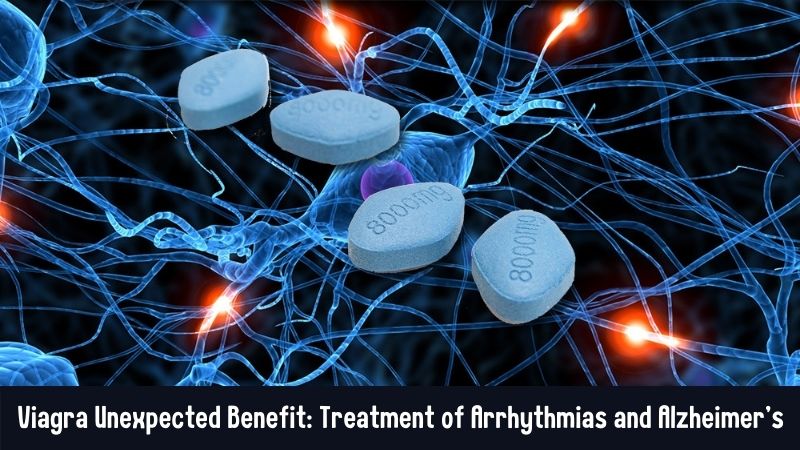Viagra Unexpected Benefit: Treatment of Arrhythmias and Alzheimer’s
Sildenafil, an erectile dysfunction drug commonly known under the trade name Viagra, has shown promising results as a drug candidate for the treatment and prevention of… Alzheimer’s disease and arrhythmias. Let’s highlight this issue in more detail.
Cardiologists have discovered the benefits of Viagra in arrhythmias
Viagra can suppress arrhythmia, experts at the University of Manchester found out. They told more about the experiment in an article in the journal Circulation Research.
Experiments on sheep heart muscle cells have shown that sildenafil is able to protect myocytes from excess calcium, which can cause arrhythmia, causing the heart to beat at a time when it should rest between beats. The researchers then injected sildenafil into sheep with torsades de pointes, an uncommon but dangerous arrhythmia in which the ventricular muscle works erratically and the heart chambers stop pumping blood into the circulatory system. If the heartbeat is not stabilized in time, the arrhythmia will lead to cardiac arrest.
Sildenafil was able to bring the heart rate back to normal in 90 seconds and reduced the risk of a second attack. The researchers believe the drug could be used to treat other arrhythmias as well.
Researchers first drew attention to the possible benefit of sildenafil in arrhythmia by observing patients with diabetes – those who took sildenafil had a reduced risk of heart attack and increased survival after a heart attack. The cause of both arrhythmia and problems with potency may be excessive activity of the phosphodiesterase type 5 enzyme, the concentration of which helps to reduce sildenafil
Viagra could lalso be used for the treatment of Alzheimer’s disease
American researchers using a network analysis among 1600 FDA-approved drugs found that sildenafil can be effective in the treatment of Alzheimer’s disease. In addition, scientists analyzed databases of US insurance companies and found that patients who used Canadian Pharmacy Viagra had a much ower risk of developing Alzheimer’s disease than other people. The Cox regression that was used for the statistical analysis was also adjusted for the age and ethnicity of the participants. True, the majority of patients in the analysis were men, which affected the heterogeneity of the sample. The study is published in Nature Aging.
Drugs for the treatment of Alzheimer’s disease appear infrequently. The FDA recently approved a new Alzheimer’s drug, the first in 18 years. The process of selecting new drugs is quite long: first, the candidate needs to pass preclinical trials, and then prove their safety and effectiveness already in humans. The task is simplified if you immediately look for candidate drugs among approved drugs – then you do not have to prove that they are safe for humans. At the same time, it often turns out that drugs that treat one disease are effective for the treatment of others. For example, metformin has recently been linked to a reduced risk of Alzheimer’s disease.
A similar approach was taken by American doctors led by Feixiong Cheng from the Cleveland Clinic: they were looking for drugs to treat Alzheimer’s disease among already approved drugs. The researchers first used computational methods to break down the molecular characteristics of Alzheimer’s disease into 13 phenotypes based on differences in gene expression, gene polymorphisms, and protein expression. Next, a network analysis was applied between information on 351444 protein-protein interactions, divided into 13 endophenotypes, and 1600 FDA-approved drugs. Each drug from the selected list is already used to treat diseases from 12 groups (cardiovascular diseases, diseases of the nervous system, respiratory diseases, and so on).
The network analysis took into account the endophenotypes of each drug, that is, which biomarkers are affected by its components. Based on the distance between the Alzheimer’s disease endophenotypes and the biomarkers affected by the drugs, the scientists calculated the most suitable drug – the one that affects most of the biomarkers associated with Alzheimer’s disease: it turned out to be sildenafil, better known as Viagra.
The researchers then analyzed databases from US insurance companies and found that patients who were prescribed Viagra had a six-year risk of developing Alzheimer’s disease that was 69 percent lower than other people.
The authors caution that the association found may be coincidental and future clinical studies are needed that will include both women and men, as well as a placebo group.
Viagra has been used in clinical practice for a long time, so it is unlikely to cause side effects in patients. The same can’t be said for a recently approved drug for Alzheimer’s disease: patients who took it showed foci of hemorrhage and swelling of the brain on MRI.
Category: Health and Wellness
Tags: Alzheimer's disease, arrhythmia, erectile dysfunction, medicine, sildenafil, Viagra


